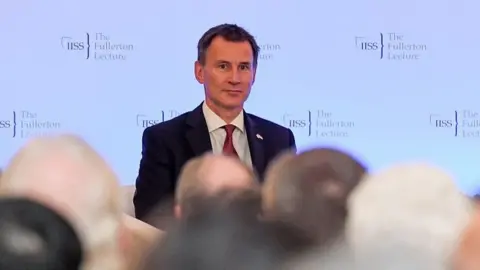Brexit: Jeremy Hunt says UK 'can learn lessons' from Singapore
 AFP
AFPThe UK can "learn lessons" from Singapore but is not looking to follow its economic model after Brexit, Foreign Secretary Jeremy Hunt has said.
Mr Hunt, who is on a visit to the Asian city-state, said Singapore's success was grounded in long-term investment in education and infrastructure.
But he said the UK would not emulate its low tax and low regulation climate, as hoped for by some Brexiteers.
MPs will vote on Theresa May's EU withdrawal deal in two weeks' time.
The UK is scheduled to leave the European Union on 29 March 2019.
But it is not clear what will happen if Parliament rejects the withdrawal terms and framework of future relations, amid continuing opposition to the package among many Conservative MPs.
Speaking in Singapore, Mr Hunt warned of "devastating social consequences" if the UK did not leave the EU in three months' time, suggesting it would send a message the government was not listening to the people.
He said the prime minister was still talking to her fellow European leaders about changes to ensure the UK was not "trapped" indefinitely in a customs union with the EU.
"I think she (Theresa May) will find a way to get this deal through Parliament and know that is what the British people would want," he said.
'Dynamism and vitality'
In a speech to business leaders, Mr Hunt said the UK had to carve out a new role for itself outside the EU and could not rely "on sentiment to stay relevant" in the 21st Century.
Some Brexiteers have said the UK should aspire to become the "Singapore of the North" - copying its high-tech economy, with low levels of taxation and corporate regulation to attract foreign investment.
Mr Hunt said Singapore "exemplified the dynamism and vitality of Asia" and the UK could learn from its "strategic approach" to maintaining a competitive economic advantage.
Speaking to the BBC earlier, he highlighted Singapore's record of educational attainment, it having topped the Pisa rankings for performance in maths, science and reading by 15-year olds for several years.
He suggested its focus on long-term economic development, which has seen it lay down a fibre optic cable network across the whole country, was also to be admired.
 EPA
EPABut he said the way that the UK funded its public services, such as the NHS, would always be different.
"We do not want and do not seek to emulate the social or political model of Singapore," he told Radio 4's Today.
"I was health secretary for nearly six years, I am a passionate defender of a health service that is free at the point of use and, if you remember, I secured quite a lot of extra money for the health service during my tenure, so those things are very different."
'Invisible chain'
Mr Hunt, who is due to visit Malaysia on Thursday, said he wanted the UK to become the "invisible chain" linking democracies, both established and fledgling ones, around the world utilising its cultural strengths and historical connections.
Parliament will begin debating Mrs May's Brexit deal in a week's time, with the crucial vote - which was postponed from December - expected to take place around 15 January.
Mr Hunt said he hoped the further assurances the PM was seeking from EU leaders on the Irish border "backstop" - a contingency arrangement which would see the UK tied to EU rules until its future relationship is sorted out - would be sufficient for MPs to back the deal.
"Theresa May has been very clear this isn't just about words but about text which has legal force," he said.
"She has also been very straightforward about this - the EU has agreed the backstop is temporary and that's a word they have agreed.
"So what we're saying, very simply, is we're not asking for anything new but we are asking you to define what temporary means, so we can have confidence we're not going to be trapped in the customs union for ever against the wishes of the British people."
